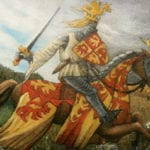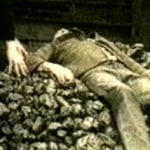 Creepy
Creepy  Creepy
Creepy  Technology
Technology 10 Scientific Breakthroughs of 2025 That’ll Change Everything
 Our World
Our World 10 Ways Icelandic Culture Makes Other Countries Look Boring
 Misconceptions
Misconceptions 10 Common Misconceptions About the Victorian Era
 Mysteries
Mysteries 10 Strange Unexplained Mysteries of 2025
 Miscellaneous
Miscellaneous 10 of History’s Most Bell-Ringing Finishing Moves
 History
History 10 Great Escapes That Ended Right Back in Captivity
 Weird Stuff
Weird Stuff 10 Fascinating Things You Might Not Know About Spiders
 Food
Food 10 Everyday Foods You Didn’t Know Were Invented by the U.S. Military
 History
History 10 Odd Things Colonial Americans Kept at Home
 Creepy
Creepy 10 More Representations of Death from Myth, Legend, and Folktale
 Technology
Technology 10 Scientific Breakthroughs of 2025 That’ll Change Everything
 Our World
Our World 10 Ways Icelandic Culture Makes Other Countries Look Boring
Who's Behind Listverse?

Jamie Frater
Head Editor
Jamie founded Listverse due to an insatiable desire to share fascinating, obscure, and bizarre facts. He has been a guest speaker on numerous national radio and television stations and is a five time published author.
More About Us Misconceptions
Misconceptions 10 Common Misconceptions About the Victorian Era
 Mysteries
Mysteries 10 Strange Unexplained Mysteries of 2025
 Miscellaneous
Miscellaneous 10 of History’s Most Bell-Ringing Finishing Moves
 History
History 10 Great Escapes That Ended Right Back in Captivity
 Weird Stuff
Weird Stuff 10 Fascinating Things You Might Not Know About Spiders
 Food
Food 10 Everyday Foods You Didn’t Know Were Invented by the U.S. Military
 History
History 10 Odd Things Colonial Americans Kept at Home
Top 10 Lesser Known Mysteries
It was Einstein that said ‘The most beautiful thing we can experience is the mysterious. It is the source of all true art and all science. He to whom this emotion is a stranger, who can no longer pause to wonder and stand rapt in awe, is as good as dead: his eyes are closed.’ For me, mystery is the fabric of Life, and since I discovered Listverse a few years ago I have noticed it’s a sentiment many people share. I have tried to avoid the usual topics of ghosts, ufo’s etc., and tried to opt for the niches and gems of the unexplained genre. I hope you have as much fun reading this list as I had compiling it. So here it is, The Top 10 Lesser Known Mysteries, and, dependent on feedback, there will be another in the pipeline. Enjoy.

The Brentford area of London is a peculiar place in terms of the names. You can buy an apartment at Griffin Flats, take in a football match at Brentford F.C‘s Griffin Stadium or have Steak and Ale Pie at the Griffin Arms Pub. To top that all off, there’s a chance you might bump into the Brentford Griffin, the mythological creature that, supposedly, fly’s and wanders around this London Borough. Griffins were historically the legendary offspring of an eagle and a lion, with their purpose being to guard hidden treasure.The first well reported sightings of the creature began in 1984 when a pedestrian , fittingly walking past the Green Dragon Apartments, saw what he described as ‘a dog with wings’ flying through the sky. He claimed to have seen the creature a year afterwards, this time getting a better look, noticing rather large wings and a long muzzle. A handful of people travelling on a bus also claimed to have sighted the Griffin, sitting on a gasometer next to the local art centre. The only other sighting in that spate was by a psychologist jogging near the Thames. The story made it to the 6 O’clock news, and phone lines were set up for people to report any sightings of the creature.
There have been no other sightings since, and the Legendary Griffin has drifted into local folklore. Other links between Brentford and the Griffin include the town’s old coat of arms, which includes a Griffin on either side of the crest. The fact that no one knows how the Griffin found its way into so many areas of local industry and history is one of the most baffling facts surrounding the legend. However, one story has surfaced to shed some light on its origins. Sir Joseph Banks, the emminent Botanist who accompanied Captain James Cook on his first Voyage of Discovery is alleged to have brought a Griffin back to England from a Pacific Island in the late 1770’s. Griffins have a lifespan that covers centuries, and many believe it is the very same Griffin that resides in Brentford to this day, revealing itself as it chooses.
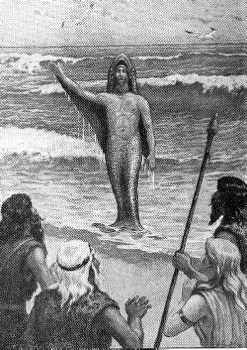
In ancient Mesopotamia, the world’s first academically ratified, fully functioning civilizations of Babylon, Sumer and Akkadia emerged. Located in the middle of an area known as the Fertile Crescent, these civilizations inhabited what is now modern day Iraq and Iran. We owe the invention of writing and the wheel, among other crucial human breakthroughs, to these peoples. Their origins are shrouded in mystery. The biggest mystery surrounding the emergence of these civilizations is their almost overnight transformation from hunter gatherers to intelligent city building civilizations. The Sumer tells us, through their own records and writings, that they were aided by Aliens in establishing themselves as a sustainable, intelligent civilization. They referred to their god’s as the Annunaki, which translates as ‘Those who came from heaven to earth.’
A Sumerian priest named Berossus recorded how an amphibian, named Oannes, emerged from the Persian Gulf and taught the Sumerians numbers, medicine, astronomy, politics, ethics and law, encompassing all the necessities for civilized existence. Before his intervention the Sumerians ‘lived like beasts in the field, with no order or rule.’ He was described as follows ‘The whole body of the animal was like that of a fish; and it had, under a fishes head, another head, and also feet below, similar to those of a man, subjoined to the fishes tail. His voice, and language, too, were articulate and human; and a representation of him is preserved to this day….When the sun set, it was the custom of this being to plunge again into the sea, and abide all night in the deep; for he was amphibious.’ Whoever Oannes was, it is certainly a given that he was exceptionally good at what he did. Sumerian astronomers were so gifted that their calculations for the rotation of the moon are only 0.4 off modern computerized calculations. They also understood that planets revolve around the sun, something that wouldn’t be hypothesized by renaissance science for thousands of years. Sumerian mathematicians were also gifted almost beyond belief for their time. A tablet discovered among the hills of Kuynjik contained a 15-digit number–195,955,200,000,000. Mathematicians from the golden age of ancient Greece could count no farther than 10,000.
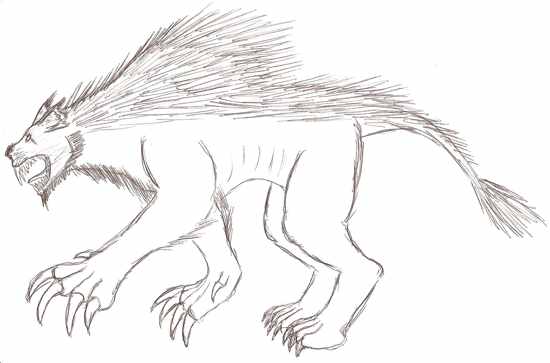
The Malawi Terror beast is the name given to an unknown cryptid that caused widespread panic and chaos in rural Malawi during the early months of 2003.Something that gives this particular story credence, in comparison to other cryptid stories, is the fact it resulted in several deaths and prompted military action.
In the district of Dowa, 100km north of the nation’s capital, Lilongwe, reports emerged of a rabid animal, with hyena like features, attacking and mauling members of the region. The graphic nature of the attacks are the most troubling aspect, with the eating of intestines and reproductive organs noted to have taken place on 2 elderly woman and a three year old infant, as well as the crushing of their skulls. In addition to these 3 deaths, 16 other people were maimed beyond recognition, with some losing hands, feet, mouths, noses and eyes. In the wake of the attack over 4,000 people left the Dowa area to take refuge in town halls, only returning home under armed guard and a sustained presence by local game keepers, the police and factions of the Malawian Army.
Those who saw the animal dismissed claims it was a Hyena, due to its large hind legs. Many local residents believed that the unknown animal is the soul of a similar beast that was killed a year before, after it slayed 5 people, and that it returned to exact revenge upon those that claimed its life. To this day what the beast was, or where it went, remain unsolved.
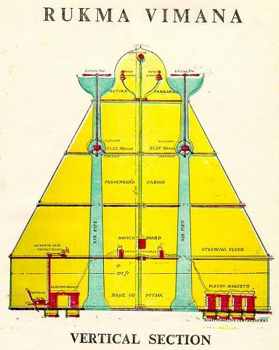
Vimanas are the mythical flying machines chronicled in the ancient Sanskrit epics of India. The story of the Vimana predates Christ by many thousands of years, and the Hindus of today’s India believe the existence and usage of Vimana to be historical fact. There is a plethora of ancient Indian literature which deals with the Vimana and its many aspects. Most of the epics await translation. One epic, titled Manusa, gives clear instructions on how to build the craft and the proponents that make them able to fly. Other texts have names such as ‘The secret of making Planes invisible’, ‘The Secret of hearing conversations and other sounds in Enemy Aircraft’ and ‘The secret of making Planes motionless’. There are many other texts about Vimana which are spoken of in the epics, but have not yet been discovered. Many texts speak of ships and planes with nuclear capabilities and a great nuclear war that took place. In the ancient ruins of Mohenjo-Daro, once part of the Indus Valley Civilization, 3000 year old skeletons where found with radioactivity levels that surpassed that of the bodies at Nagasaki and Hiroshima. The ruins themselves also emit high radioactivity levels. It is a documented fact that the city was destroyed suddenly.
The wording of the texts is highly technical, and speaks at a high level of intellectual maturity in areas such as physics and aero dynamics. One text of the Vaimanika Shastra, which translates as ‘Science of Aeronautics’, includes 230 stanzas, concerning aviation matters such as construction, take off, cruising for thousands of miles, normal and forced landing, protections of the airships from storm and lightening and how to switch the power source to solar energy from free energy. The same text describes at great detail the construction of the mercury vortex engine, which is the forerunner of the Ion vortex engine used today by NASA. In 1895, a Sanskrit scholar named Shivkar Talpade designed an aircraft based solely on the Sanskrit document concerning the mercury vortex engine. The unmanned craft reached a height of 1500ft.

In the Nahanni National Park of Northwest Canada lies the Nahanni River. The area is only accessible by boat or plane and is home to many natural wonders, such as sinkholes, geysers and a waterfall almost double the size of Niagara Falls. Lord Tweeds Muir (John Buchan), author of The 39 Steps, once said of the valley: “It’s a fancy place that old-timers dream about. … Some said the “valley was full of gold and some said it was hot as hell owing to the warm springs. … It had a wicked name too, for at least a dozen folks went in and never came out’ … Indians said it was the home of devils.”
The 200 Mile gorge has become infamous, due to a number of gruesome deaths and many disappearances, earning itself the eerie name, The Valley of the Headless Men. Anomalies first began in 1908, when the Macleod Brothers came prospecting for gold in the valley. Nothing was heard or seen of the brothers for a whole year, until their decapitated bodies were found near a river. Nine years later, the Swiss prospector Martin Jorgenson was next to succumb to the Valley, when his headless corpse was found. In 1945, a miner from Ontario was found in his sleeping bag with his head cut from his shoulders. While skeptics of an unknown power at work in the Valley would put the grizzly mutilations down to feuding gold prospectors or hostile Indians, there are other strange happenings in the area which add to the valleys mysteriousness. The fiercely renowned Naha tribe simply vanished from the area a few years prior to the first deaths. Other Indians of the area have avoided the Valley for centuries, claiming an unknown evil haunts it. Many parts of the valley remain unexplored, and there are tales the Valley holds an entrance to the Hollow earth. Others believe the Valley is home to a lost world, with lush greenery and a tropical climate, due to the hot springs generating warm air, as well as untapped goldmines and wandering sasquatches. While a haven for Bigfoot remains unlikely, one thing is for certain, something strange lurks in the Nahanni Valley.
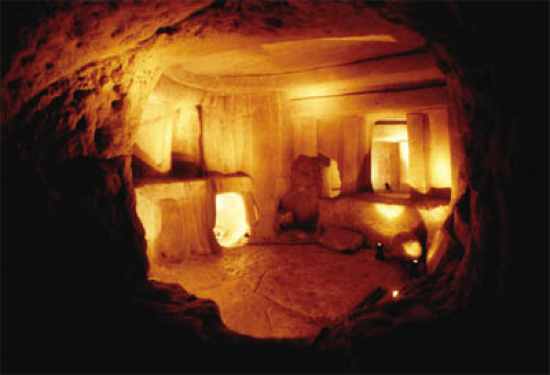
In 1902, in the town of Paola on the island of Malta, workers making way for a new housing development stumbled across a vast subterranean complex that dated back to Malta’s prehistoric period, some 3000 years ago. The sight has since became a UNESCO world Heritage site, and was officially named the Hal Saflieni Hypogeum. A more extensive archaeological survey of the site was undertaken, and it became clear that all was not as simple as it seemed. Over 30,000 human skeletons were found in burial chambers dotted across the site, including men, women and children. Many skulls had unusually widened craniums and baffled scientists in terms of ethnic origin. Stories began spreading that it was tangible evidence of a subterranean human species.
The islands earliest inhabitants engaged in human sacrifice to appease their god of the underworld, who they believed dwelled beneath the island itself. The name they gave to him roughly translates as ‘Serpent’. When Saint Paul was shipwrecked on the island as recorded in the bible, he documented this, and even claimed to have been bitten by the serpent himself. He also spent a great deal of time there converting the people from their primitive worship of a reptilian deity to Catholicism. It is believed, by some scholars, that the human sacrifices were involuntarily cast down into the catacombs, to be devoured by the serpent and prevent the islanders from incurring his wrath.
Rumors of a cover-up, by the Maltese government and other authorities, are rife with stories including the scrubbing of texts and ancient drawings from the catacomb walls, and the mysterious and sudden death of the sites first head archaeologist. The underground complex still hasn’t been fully explored. A British embassy worker in the 1940’s, gave an account of foraying into the sites lowest room on the last level, after convincing the tour guide to allow her access to an area usually off limits to the public. Upon entering a small portal in the wall she claimed to have seen 20 reptilian beings covered in white hair on a ledge across from her. One raised his palm and subsequently her candle extinguished. She made a quick exit but upon returning some days later she was told that the guide who had shown her the portal had never been employed at the site and no such portal existed.

When America’s founding fathers were deep in the volatile business of signing the Declaration, Treason was a resounding word. The signing of the declaration by any man would result in gruesome torture and death by the British Colonialists. With every argument put forward being met with shouts of ‘Treason!!Treason!!!’, talks had hit a stumbling block. It was then that an unknown man arose, dressed in a black cape, to deliver this stirring oration. “They may stretch our necks on all the gibbets in the land; they may turn every rock into a scaffold; every tree into a gallows; every Horne into a grave, and yet the words of that parchment can never die! They may pour our blood on a thousand scaffolds, and yet from every drop that dyes the axe a new champion of freedom will spring into birth! The British King may blot out the stars of God from the sky, but he cannot blot out His words written on that parchment there. The works of God may perish: His words never!
“The words of this declaration will live in the world long after our bones are dust. To the mechanic in his workshop they will speak hope: to the slave in the mines freedom: but to the coward kings, these words will speak in tones of warning they cannot choose but hear …
“Sign that parchment! Sign, if the next moment the gibbet’s rope is about your neck! Sign, if the next minute this hall rings with the clash of falling axes! Sign, by all your hopes in life or death, as men, as husbands, as fathers, brothers, sign your names to the parchment, or be accursed forever! Sign, and not only for your selves, but for all ages, for that parchment will be the textbook of freedom, the bible of the rights of man forever.’’
The speech goes on for some time and continues with the orator’s impassioned vouch for American freedom from the British. The founding fathers then descended into a frenzy to sign the document, and, within a few minutes, the Declaration was born. However, when the signers turned to congratulate the man, he had simply vanished. Nobody knew who he was or where he went. Some believe that he was Count St Germain, or an unknown Rosicrucian. There are also accounts of a mysterious Professor at the time, who helped design the first American Flag, and was a great friend and teacher of Franklin and Washington. In the longer annals of his speech there are many cryptic references to future events that would shape America. He mentioned the Rights of Man, even though it wasn’t to be published for another 13 years. He also mentions the all Seeing Eye, something which would go on to be found on the Dollar. A candidate many believe to be a true possibility is Francis Bacon. His treatise, ‘New Atlantis’, lays out the political structure and necessities he believes necessary for a paradise like State, which some believe he made real in the new land of America. He was also a prominent Freemason, as were Franklin and Washington, and this is another possible link due to the staggering amount of Freemason Imagery in Washington D.C. Whoever the Unknown Man of the American Declaration was, and whatever his motives were, one thing remains perhaps the biggest mystery: Why is such anonymity at this key moment in human history, to this day, simply overlooked.
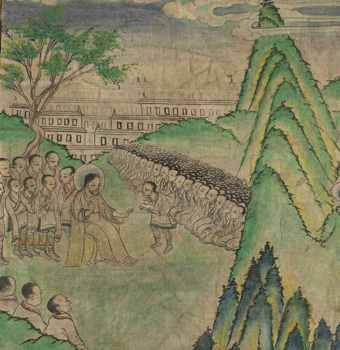
The lost years of Jesus refer to his activities between the ages of 12 and 30, of which there is no mention in the bible. The church would have us believe that what transpired during these years is of no biblical importance, and thus omitted from the gospels. In the Gospels of Luke, in one extract Jesus is 12 and in the Temple at Jerusalem, in the following extract he is 30 and is being baptized in the river Jordan by John the Baptist. Many theories have surfaced regarding his whereabouts during these years, the most prominent being that Jesus joined a trade caravan and travelled to the Far East, following the silk route under the guidance of a cabal of merchants.
Referred to as St. Issa in Buddhist and Hindu lore and texts, it is said Jesus journeyed through modern day Iraq, Iran, Afghanistan and Pakistan, before traveling extensively through India and settling in Tibet. He studied and lived among the Buddhist monks for 6 years before returning to Jerusalem to preach. There is some evidence to support this. In 1887, Russian Explorer and Aristocrat Nicholas Notovich stayed at the Hemis Monastery in Ladakh, Northern India, while recuperating after a broken leg. He heard of a text within the monastery library called ‘The Life of St Issa, Best of the Sons of Men’ after the monks had spoke of an ‘Issa’ being a student at the monastery over a thousand years ago. Through a translator, the story was read to Notovich by the head lama, while Notovich furiously scribbled down what he could. His book on the subject, ‘The Secret Life of Jesus Christ’, can still be bought. Rumors persist of the text Notovich saw still existing in the Hemis Library. Perhaps the most irrefutable piece of evidence comes from the Bhavishya Maha Purana, a highly respected ancient Indian text. The King of Kashmir, in the early first century AD, records how he met a fair haired, fair complexioned teacher dressed in white robes who came from the west, described himself as being born of a virgin, persecuted by his people and being the son of God.
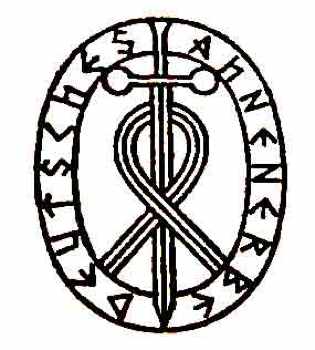
Before World War 2 ravaged Europe, and during the war, the Nazis spent a large amount of resources and manpower on their quest to establish the origins of their beloved Aryan Race. The institution founded to spearhead this endeavor, as well as all other manner of occult and esoteric studies, was the Ahnenerbe, started by Heinrich Himmler, in 1935. They conducted archaeological and cultural studies in a number of countries including Sweden, Finland, Iraq, Antarctica, Poland and, in particular, Tibet. The official story of the 3 expeditions sent to Tibet was to investigate the myth that an Aryan Race conquered most of Asia and the Himalayas many thousands of years ago. Some believe however they were searching for Shambhala, situated deep in the Himalayas, and hoping to harness the great power found deep within its realm, as told in many ancient texts . There is much evidence that The Nazis found something. After the fall of Berlin, soviet soldiers discovered hundreds of Tibetan Buddhist monks in SS uniforms, who seemed to have committed mass suicide. None of the bodies were able to be identified, thus it remains a total mystery as to how they got there, who they were and what they were up to. The Nazis found the time and necessary funds to transport transmitters to the furthest reaches of the Himalayas to maintain constant radio contact, which fuels the thesis they were on the brink of discovering something big or at least were certain they were heading in the right direction.
1930’s German Academic, Theodore Illion, describes in his work ‘Darkness over Tibet’ his elation at finding a hole the ground of the Tibetan Countryside and, upon entering, finding an underground city of monks. He learned they were ‘Black Yogis’, who aimed to control the world through astral projection and telepathy. His elation turned to horror when he discovered food that had been given to him by the monks contained human flesh. He made for his escape and was pursued by the monks across Tibet until he reached safety in his German homeland. His account came out in 1937, and, within a year of its publication, Hitler had sent his occult research wing forth to the mystical area Illion chronicled. It is suggested that Hitler’s objective was to establish contact with these obscure sorcerer monks. The route taken by the Ahnenerbe through Tibet emulated one taken by Aliester Crowley, and this, in turn, was copied by the OSS (the predecessor of the CIA) in 1942, in a highly secretive mission. The Tibet Nazi Connection is one of the most absorbing topics of the unexplained genre, and to this day its facts and true happenings remain shrouded in mystery.
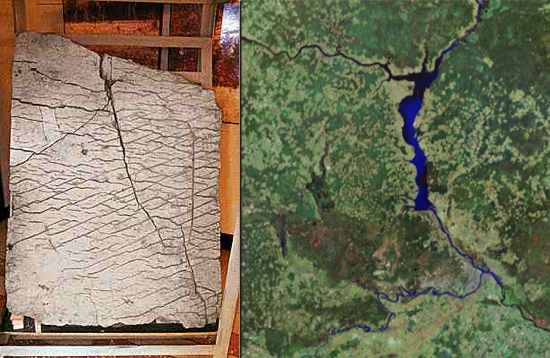
In terms of mysteries, few come along as incredible and irrefutable as The Ural Relief Map. In 1995, Aleksandr Chuvyrov, Professor of Mathematical and Physical Science at Bashkir State University in Russia, was investigating hypotheses of the immigration of Chinese Migrants to Siberia and the Urals. During his research he heard an account from the 18th century telling of a series of strange white slabs scrawled with some unknown language. As they were supposedly situated in an area central to his study, a remote village named Chandar the southern Urals, he thought the stones could be of Chinese Origin. and organized a team and helicopter to try and locate them. After several searches and village hopping in his helicopter he could find no trace of the elusive stones. It was then that a village elder approached him and asked him to take a look at a strange slab he found in his back yard. The slab he was taken to was the Ural Relief Map, also dubbed ‘The Map of the Creator’
Showing a relief scale of the entire southern Urals, the slab accurately shows its three main rivers, the Belya, Ufimka and Sutolka, as well as the Ufa canyon. After the map was studied further it was understood to show a giant irrigation system, consisting of two 500 meter wide channel systems, 12 dams, each 400 meters wide, 10km long and 3km deep. It is calculated that 1 quadrillion cubic meters* of earth were shifted to allow for the dams to be built. After initial tests failed to provide an age for the stone, a breakthrough was made when 2 types of prehistoric shell were found embedded in its surface, Navicopsina munitus and Ecculiomphalus Princeps. The former existed 500 million years ago, while the latter existed 120 million years ago. Scientists place its actual age at 120 million years. A geological test of the slab concluded that it consisted of 3 layers, the base being 14cm thick dolomite, the second being a diopside glass unknown to science, while the third is a protective layer of calcium porcelain. Chuvyrov said ‘It should be noted, that the relief has not been manually made by an ancient stonecutter. It is simply impossible. It is obvious that the stone was machined.’ X rays confirmed it was made by precision tools. Interestingly scientists believe that the map is actually part of a relief map of the entire world, due to the crudeness of the areas around the maps’ perimeter. Soil tests of 400 types of soil in the area, in comparison to the ones found embedded on the stone, have allowed scientists to narrow down the possible location of other pieces to 4 specific areas around the village of Chandar. So what is the Ural Relief Map? God’s discarded blueprint? Ancient Extra Terrestrial resource chart? It remains a Mystery.
